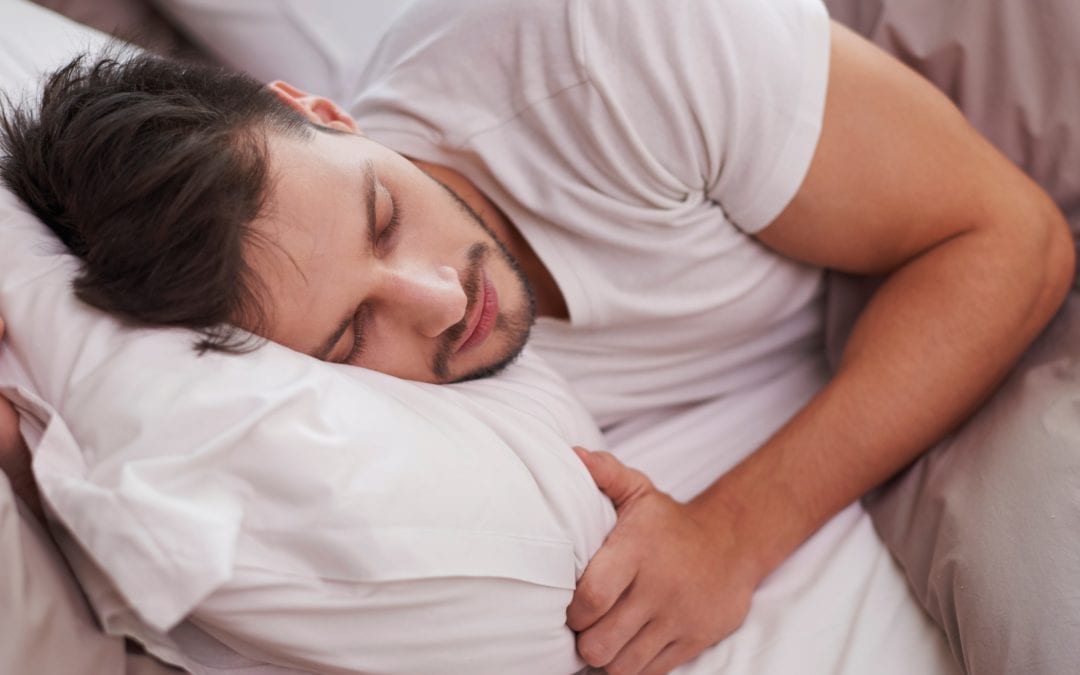Many things contribute to our modern epidemic of poor sleep, but most can agree that pain makes sleep difficult. A study reported in the October 2015 issue of the Public Library of Science journal examined the sleep patterns of patients with knee and back pain.
It would seem that people with back pain would be more comfortable lying down rather than standing erect. While this is the case for many, it really depends on what’s causing the back pain. There are specific back problems such as spinal stenosis, or ankylosing spondylitis (in which back vertebrae fuse together) that are more painful when lying down. But other issues such as inflammation can worsen when the body is in a prone position for long periods of time. When arthritis patients don’t move for long periods of time, joint linings can become congested with excess fluid—whose purpose is to bathe the cells—and with protein-waste products. These waste products are normal and routinely are flushed away. When a body is immobile at night, these processes are slowed and can lead to pain and stiffness in arthritic knees or arthritic back. The pain can awaken you, or prevent you from falling asleep in the first place.
There are other issues such as instability, which can make lying down all night in certain positions more painful for knees or backs. Your spine is like a series of blocks threaded on a string. Muscles and ligaments hold the vertebrae in position during movement. When and ligaments that hold the vertebrae in place are severely stretched or injured, the vertebrae can move ever so slightly out of position. When erect, gravity pulls downward, with your vertebrae stacked like a tower. When lying down however, muscles relax and gravity pulls the vertebrae laterally. If there is enough lack of stability caused by loose ligaments, atrophied muscles, or degenerated discs, this micro-movement while lying down can be quite painful and can cause spasms. A mattress that can create enough external support may help.
With knees, while the symptoms may only be felt in the knee, knee pain often originates in the back due to misfiring nerves caused by a host of issues. One of those issues is with the L5 nerve, which goes to the outside hamstring muscle also known as the biceps femoris. A disc bulge at L5-S1 irritates the exiting L5 nerve, which makes the lateral hamstrings tight, which in turn impacts how the knee joint works. When moving into a standing position, the tight hamstrings muscle doesn’t allow the femur to get out of the way of the meniscus effectively, pinching the meniscus. Left untreated, this type of problem often causes a tear and cartilage defect in the lateral posterior meniscus and femoral condyle—not a pretty picture. If you experience knee pain at night, putting a pillow under your knee to keep it supported in a slightly bent position, may provide enough support to make sleeping more comfortable.
The study reported by the Public Library of Science journal questioned 9,611 subjects ages 39-67. Of these subjects, 29 percent had knee pain, 42 percent had back pain, and 17.6 percent had both knee and back pain. Lack of sleep was defined as fewer than 6 hours a day, and both sleep quality and knee pain and back pain were evaluated by yes and no questions. Unsurprisingly, both knee pain and back pain negatively affected both duration and quality of sleep. In addition, having both knee and back pain had an additive correlation and created the most negative effect on sleep.
The purpose of the study was to determine the general effect of knee and back pain on sleep. There were no indications on the sources of knee or back pain, and no attempt was made to determine how particular knee or back problems affect sleep. There are a few organ-related medical issues that can also cause worsening back pain when lying down, so if the problem gets worse and you don’t have a known back problem, getting cleared by a physician could be a good idea. In the meantime, handle any small back and knee issues when they come.
“Knee and Back Pain and Sleep Problems” first appeared as a post on the Regenexx blog.
Like all medical procedures, Regenexx procedures have a success and failure rate.
Not all patients will experience the same results.
